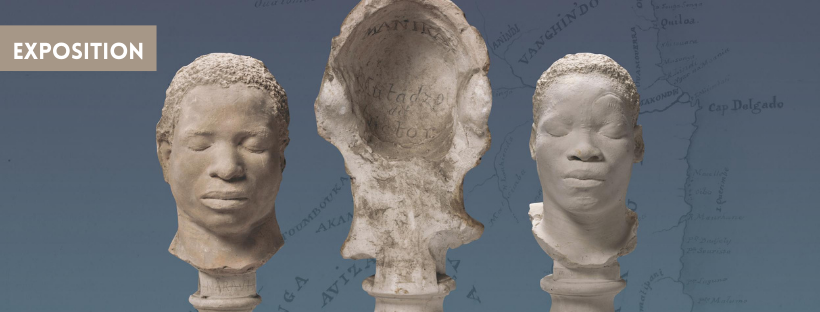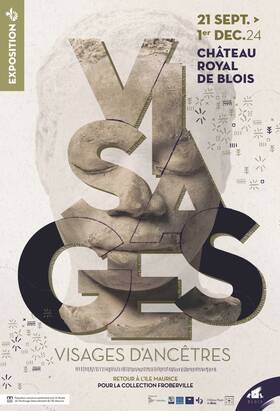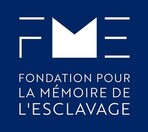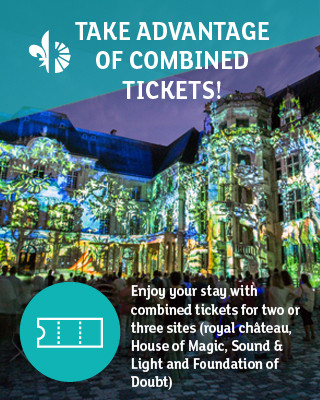EXHIBITION - Faces of Ancestors: The Froberville Collection Returns to Mauritius
exhibition

From 21 September to 1 December 2024
 The Château Royal de Blois contains the François I staircase and the memory of Catherine de’ Medici, but also amazing collections from a variety of origins, which are put on display for the public during temporary exhibitions. Since 1940, the Château Royal de Blois has held 53 busts of a series of 62 faces which the ethnographer Eugène de Froberville cast out of plaster in 1846, based on former captives who were forcibly removed from East Africa to Mauritius. From 21 September through 1 December 2024, the exhibition Faces of Ancestors: The Froberville Collection Returns to Mauritius will be presenting that collection for the first time ever, contextualized thanks to never-before-seen documents. An extraordinary account of the history of slavery, this exhibition – organized by the Town of Blois – was designed by the Château Royal de Blois Preservation Society and by Klara Boyer-Rossol, a historian and scientific curator. This event is being held in partnership with the Intercontinental Slavery Museum in Port-Louis, Mauritius, and the Foundation for the Remembrance of Slavery.
The Château Royal de Blois contains the François I staircase and the memory of Catherine de’ Medici, but also amazing collections from a variety of origins, which are put on display for the public during temporary exhibitions. Since 1940, the Château Royal de Blois has held 53 busts of a series of 62 faces which the ethnographer Eugène de Froberville cast out of plaster in 1846, based on former captives who were forcibly removed from East Africa to Mauritius. From 21 September through 1 December 2024, the exhibition Faces of Ancestors: The Froberville Collection Returns to Mauritius will be presenting that collection for the first time ever, contextualized thanks to never-before-seen documents. An extraordinary account of the history of slavery, this exhibition – organized by the Town of Blois – was designed by the Château Royal de Blois Preservation Society and by Klara Boyer-Rossol, a historian and scientific curator. This event is being held in partnership with the Intercontinental Slavery Museum in Port-Louis, Mauritius, and the Foundation for the Remembrance of Slavery.
This exhibition aims to give the cast individuals a voice in order to provide a new interpretation of these busts, freed from prejudices and the “science of the races” and instead focused on the culture, experience and story of those human beings. Historical research has made it possible to identify the busts and link them to never-before-seen documents. Visitors will embark on an immersive tour during which they will encounter restored busts and the narratives of their lives. This exhibition is also the first step in the Froberville Collection’s journey to Mauritius, where it will be on loan to the Intercontinental Slavery Museum in Port-Louis beginning in 2025.
Faces of Ancestors: The Froberville Collection Returns to Mauritius is both a cultural and heritage project, as well as – more broadly speaking – a memorial event rooted in contemporary social issues.
Useful information
- Exhibition on display from 21 September to 1 December 2024
- Included in the price of admission
- With information sheets in English
- Download the exhibition's Press Kit HERE
Exhibition catalogue (in French)
Klara Boyer-Rossol (Ed.) Editions Le Charmoiset, 2024 115 pages | €24 | Available at the Château’s gift shop
Organization of the exhibition
The exhibition is being organized for the City of Blois by the Château Royal de Blois’s teams and preservation society. The exhibition’s scientific curator is Klara Boyer-Rossol, a historian, researcher and member of CIRESC (International Research Centre on Slaveries and Post-Slaveries). A specialist in the different forms of the slave trade and slavery in the western Indian Ocean throughout the 19th century, she explores the connections between slavery, colonization and the circulation of collections of human remains and cultural objects in the southwestern Indian Ocean. She notably co-edited Les Esclavages en Afrique (Forms of Slavery in Africa) with Marie-Pierre Ballarin (Karthala, Esclavages, 2024) and Représentations visuelles et culture matérielle de l’esclavage (Visual Representations and Tangible Culture of Slavery) with Ana Lucia Araujo and Myriam Cottias (UNESCO, CNRS Editions, 2024).
Partners
This exhibition was produced in partnership with the Intercontinental Slavery Museum in Port-Louis, Mauritius, and has also benefited from the scientific collaboration of CIRESC (International Research Centre on Slaveries and Post-Slaveries), ANOM (French National Overseas Archives), the Memorial to the Abolition of Slavery in Nantes, France, the Museum of Aquitaine in Bordeaux, France, the Museum of Man in Paris, France, and the FME (Foundation for the Remembrance of Slavery) for the education and mediation components.
With the financial support of




The Chateau is currently open from 10am to 5pm (last admission at 4:30pm)










